|
|
|
Sort Order |
|
|
|
Items / Page
|
|
|
|
|
|
|
| Srl | Item |
| 1 |
ID:
085004
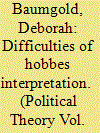

|
|
|
|
|
| Publication |
2008.
|
| Summary/Abstract |
Idiosyncrasies of Hobbes's composition process, together with a paucity of reliable autobiographical materials and the norms of seventeenth-century manuscript production, render interpretation of his political theory particularly difficult and contentious. These difficulties are surveyed here under three headings: (1) the process of "serial" composition (meaning the production of multiple, often expanded, versions of a work), which was common in the period; (2) the relationship between Hobbes's three political-theory texts- the Elements of Law, De Cive, and Leviathan, which is basic to defining the textual embodiment of his theory, and controversial; and (3) his method of writing. I argue that Hobbes's composition process undercut his intention to produce a deductive, logical theory of politics and opened the door to inconsistency and muddle in his arguments.
|
|
|
|
|
|
|
|
|
|
|
|
|
|
|
|
| 2 |
ID:
085339
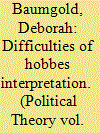

|
|
|
|
|
| Publication |
2008.
|
| Summary/Abstract |
Idiosyncrasies of Hobbes's composition process, together with a paucity of reliable autobiographical materials and the norms of seventeenth-century manuscript production, render interpretation of his political theory particularly difficult and contentious. These difficulties are surveyed here under three headings: (1) the process of "serial" composition (meaning the production of multiple, often expanded, versions of a work), which was common in the period; (2) the relationship between Hobbes's three political-theory texts- the Elements of Law, De Cive, and Leviathan, which is basic to defining the textual embodiment of his theory, and controversial; and (3) his method of writing. I argue that Hobbes's composition process undercut his intention to produce a deductive, logical theory of politics and opened the door to inconsistency and muddle in his arguments.
|
|
|
|
|
|
|
|
|
|
|
|
|
|
|
|
| 3 |
ID:
164976
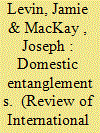

|
|
|
|
|
| Summary/Abstract |
This article revisits the Hobbesian account of the state of nature and the formation of states, attending to Hobbes’s account of the family. Drawing on feminist readings, we find in the Leviathan an account of the family as a natural political community. We contend specifically that a focus on conceptions of family life in the Leviathan, and in works by Hobbes’s early modern peers, points to the role of the family as a site of socialisation in the prelude to early state formation and in the formation of political hierarchies more generally – including, we suggest, the formation of international hierarchies. These accounts have thus far been missing from International Relations theory. Contra conventional IR theoretic readings of the Leviathan, the Hobbesian state of nature contains the seeds of both anarchy and hierarchy, as overlapping social configurations. While anarchy emerges clearly in the famous condition of ‘war of all against all’, hierarchy also exists in Hobbes’s depiction of family life as a naturally occurring proto-state setting. On the basis of this contemporary feminist analysis of a classic text, we consider implications for the emerging ‘new hierarchy studies’ in IR.
|
|
|
|
|
|
|
|
|
|
|
|
|
|
|
|
| 4 |
ID:
084507
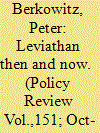

|
|
|
| 5 |
ID:
128289
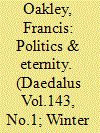

|
|
|
|
|
| Publication |
2014.
|
| Summary/Abstract |
The Leviathan is the greatest. Perhaps the sole. Masterpiece of political philosophy written in the English language. And the history of our civilization can provide only a few works of similar scope and achievement to set beside it. Consequently, it must be judged by none but the highest standards and must be considered only in the widest context. The masterpiece supplies a standard and a context for the second-rate. which indeed is but a gloss: but the context of the masterpiece itself. the setting in which its meaning is revealed. can in the nature of things be nothing narrower than the history of political philosophy.
|
|
|
|
|
|
|
|
|
|
|
|
|
|
|
|
| 6 |
ID:
129633
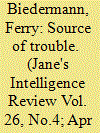

|
|
|
| 7 |
ID:
177563
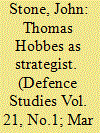

|
|
|
|
|
| Summary/Abstract |
Hobbes’ relevance to the concerns of strategy has gone unappreciated. He is, after all, interested in escaping the condition of war, rather than exploiting its political utility. And yet, exactly because of this, Leviathan addresses the principal difficulty with strategic deliberation – which is the epistemic deficit that attends human interaction, encouraging anticipatory violence. As the military theorist Carl von Clausewitz observed, minimizing the costs of war involves identifying opportunities for exercising mutual restraint over its conduct. And achieving this requires that the aforementioned epistemic deficit be ameliorated. For Hobbes, the sovereign state achieves this for its citizens; but he also considers other solutions in the context of relations between such states. The resulting insights are relevant to matters such as nuclear deterrence, and recent stability operations in the Middle East.
|
|
|
|
|
|
|
|
|
|
|
|
|
|
|
|
| 8 |
ID:
085340
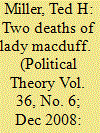

|
|
|
|
|
| Publication |
2008.
|
| Summary/Abstract |
Stephen White and Gianni Vattimo have argued in favor of weak ontological thought. Particularly for White, weak ontology's contestable fundamentals are a superior response to strong ontologies, including the violence linked to them. I make a historically comparative evaluation of their arguments. The evaluation draws on William Davenant's Restoration revision of Shakespeare's Macbeth. Davenant's play defends Charles II's sovereignty against the strong ontological claims of orthodox Anglicans. Lady Macduff's much expanded role and the death she suffers, in contrast to her counterpart in Shakespeare's Folio, are key vehicles for this defense. Davenant's revisions are linked in this interpretation to Charles II's Happy Act of Indemnity and Oblivion of 1660. Also explored are new connections between Macduff and the witches. I argue Davenant exemplifies a contingency unanticipated by weak ontology advocates: he is both antifoundational and in favor of violence. Antifoundational arguments aid more political persuasions than often imagined.
|
|
|
|
|
|
|
|
|
|
|
|
|
|
|
|
|
|
|
|
|